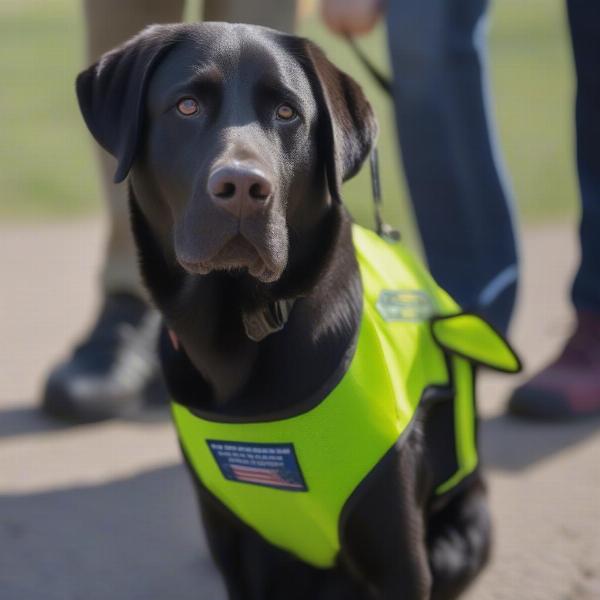Getting a diabetic service dog (DSD) for free can be challenging, but it’s not impossible. These highly trained canines can detect changes in blood sugar levels, alerting their owners to potentially dangerous highs or lows. This article will explore the process of obtaining a DSD for free, covering various options, eligibility criteria, and the commitment involved.
Understanding the Role of a Diabetic Service Dog
DSDs are trained to identify the scent of specific chemicals released by the body when blood sugar levels fluctuate. They alert their handlers to these changes through specific behaviors like nudging, pawing, or barking, allowing for proactive measures like checking blood sugar and taking necessary actions. This early warning system can prevent severe hypoglycemic or hyperglycemic episodes, enhancing the independence and safety of individuals with diabetes.
Exploring Free or Subsidized DSD Programs
Several non-profit organizations specialize in training and placing DSDs with individuals in need. Researching these organizations is the first step. Some organizations may offer fully subsidized dogs, while others might provide financial assistance, reducing the overall cost significantly. Eligibility requirements often include demonstrating financial need and having a documented medical history of diabetes.
 Non-profit organization training diabetic service dogs
Non-profit organization training diabetic service dogs
Fundraising for a DSD
If free programs aren’t an option, fundraising can help cover the costs. Creating online fundraising campaigns through platforms like GoFundMe or sharing your story within your community can attract potential donors. Organizing local events like bake sales or car washes can also contribute to your fundraising goal.
Applying for Assistance and Grants
Various grants and financial assistance programs specifically designed for service dog acquisition might be available. Thorough research and contacting relevant organizations can unveil these opportunities. Be prepared to provide detailed medical documentation and demonstrate financial need to qualify for these programs.
The Commitment of Owning a DSD
Owning a DSD involves significant responsibility. Providing proper care, including regular veterinary check-ups, nutritious food, and ongoing training, is crucial. DSDs are working dogs, but they’re also companions, requiring love, attention, and a nurturing environment.
Finding Reputable DSD Organizations
Locating reputable organizations is essential. Look for accreditation from recognized service dog organizations. Research the organization’s training methods, success rates, and the health and temperament of their dogs. Talking to current or previous DSD recipients from an organization can provide valuable insights.
Conclusion
Acquiring a DSD for free requires effort and research, but the benefits are immeasurable for individuals with diabetes. Exploring various options, demonstrating genuine need, and understanding the commitment involved can make the dream of having a DSD a reality. Remember to research thoroughly and connect with reputable organizations for guidance.
FAQ
- How long does it take to get a DSD? The waiting time can vary significantly, ranging from several months to a couple of years, depending on the organization and availability.
- What breeds are typically used as DSDs? Breeds like Golden Retrievers, Labrador Retrievers, and Poodles are often chosen for their intelligence, trainability, and temperament.
- Are there age restrictions for receiving a DSD? Requirements vary depending on the organization, but generally, applicants need to be able to handle the responsibilities of caring for a service dog.
- Can I train my own dog to be a DSD? While possible, it’s highly recommended to obtain a DSD from a reputable organization that specializes in this type of training.
- What ongoing costs are associated with owning a DSD? Costs include food, veterinary care, grooming, and ongoing training and supplies.
- Do landlords have to accept DSDs even with a “no pets” policy? In most places, service dogs are legally allowed to live with their handlers, even in “no pets” housing.
- What happens to a DSD when its handler can no longer care for it? Reputable organizations often have plans in place for the care of retired or re-homed DSDs.
ILM Dog is a leading international online resource for dog care and upbringing, providing expert advice on everything from breed selection to senior dog care. Whether you’re a seasoned dog owner or just starting your journey, we offer valuable resources to help you navigate every aspect of dog ownership. For expert advice, contact us at [email protected] or +44 20-3965-8624. ILM Dog offers expert guidance on breed selection, health care, training, nutrition, grooming, and much more.